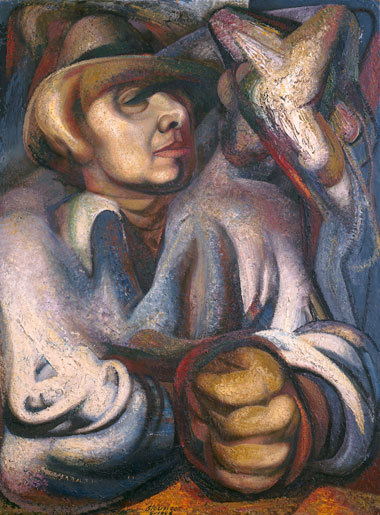Don't wanna be here? Send us removal request.
Photo
BARBARA KRUGER, NO, 1985

Barbara Kruger has inspired generations with her iconic works layering text over mass-media images, often examining stereotypes and behaviors of consumerism informed by a feminist critique.
"No,“ 1985, by Barbara Kruger © Barbara Kruger Courtesy Mary Boone Gallery
111 notes
·
View notes
Photo

ISAMU NOGUCHI, HISTORY AS SEEN FROM MEXICO IN 1936
22 notes
·
View notes
Photo

DAVID ALFARO SIQUEIROS, AMÉRICA TROPICAL: OPRIMIDA Y DESTROZADA POR LOS IMPERIALISMOS, 1932 (“Roberto Berdecio, a close associate of Siqueiros during the 1930s, stands in front of América Tropical shortly after completion”)
#david alfaro siqueiros#america#america tropical#tropical america#1930s#painting#mural#olvera street#los angeles
8 notes
·
View notes
Photo


DAVID ALFARO SIQUEIROS
#david alfaro siqueiros#self-portrait#painting#mexican#mexico#muralism#los tres grandes#the big three
7 notes
·
View notes
Photo


JORDAN NASSER, (TOP) A GREEN SUN AN EXTINGUISHED SUN A GREEN SUN, 2019; (BOTTOM) A LOST KEY, 2019
#jordannasser#palestine#palestinianart#freepalestine#embroidery#homeland#cross-stitch#cross stitch#tatreez#landscape
67 notes
·
View notes
Photo


OSWALDO GUAYASAMIN, MUJERES LLORANDO I - VII
3 notes
·
View notes
Photo

MIRA SCHENDEL, FROM THE SERIES GRAPHIC OBJECTS, 1972
18 notes
·
View notes
Photo



HORST JANNSON
3 notes
·
View notes
Photo

ANDRÉ MASSON, COVER DESIGN FOR ACÉPHALE
#andre masson#andremasson#surrealismo#surrealism#acephale#ophiucus#dissidentsurrealism#dissident surrealism
18 notes
·
View notes
Photo

ANDRÉ MASSON, ALLÉGORIES FÉMININES [FEMININE ALLEGORIES], C. 1925
13 notes
·
View notes
Photo

FRANCISCO CORNEJO, MAYAN THEATER, LOS ANGELES, 1927
#franciscocornejo#francisco cornejo#mayantheater#mayan theater#DTLA#1920s#sculpture#facade#Mayan Revival#Mayanrevival#mayan#maya#deco#artdeco#modernarchitecture#twentieth century architecture
1 note
·
View note
Quote
In its most radical forms dissimulation becomes mimicry. The Indian blends into the landscape until he is an indistinguishable part of the white wall against which he leans at twilight, of the dark earth on which he stretches out to rest at midday, of the silence that surrounds him. . . . Roger Callois has pointed out that mimicry is not always an attempt to foil the enemies that swarm in the outside world. Insects will sometimes ‘play dead’ or imitate various kinds of decomposed material, out of a fascination for death, for the inertia of space. This fascination – I would call it life’s gravitational force – is common to all living things, and the fact that it expresses itself in mimicry shows that we must consider it as something more than an instinctive device for escaping from danger or death. Mimicry is a change of appearance rather than of nature, and it is significant that the chosen representation is either of death or of inert space. The act of spreading oneself out, of blending with space, of becoming space, is a way of rejecting appearances, but it is also a way of being nothing except Appearance. . . . We dissimulate in order to deceive ourselves, and turn transparent and phantasmal. But that is not the end of it: we also pretend that our fellow man does not exist. This is not to say that we deliberately ignore or discount him. Our dissimulation here is a great deal more radical: we change him from somebody into nobody, into nothingness. And this nothingness takes on its own individuality, with a recognizable face and figure, and suddenly becomes Nobody
Octavio Paz, Labyrinth of Solitude (1985)
3 notes
·
View notes










